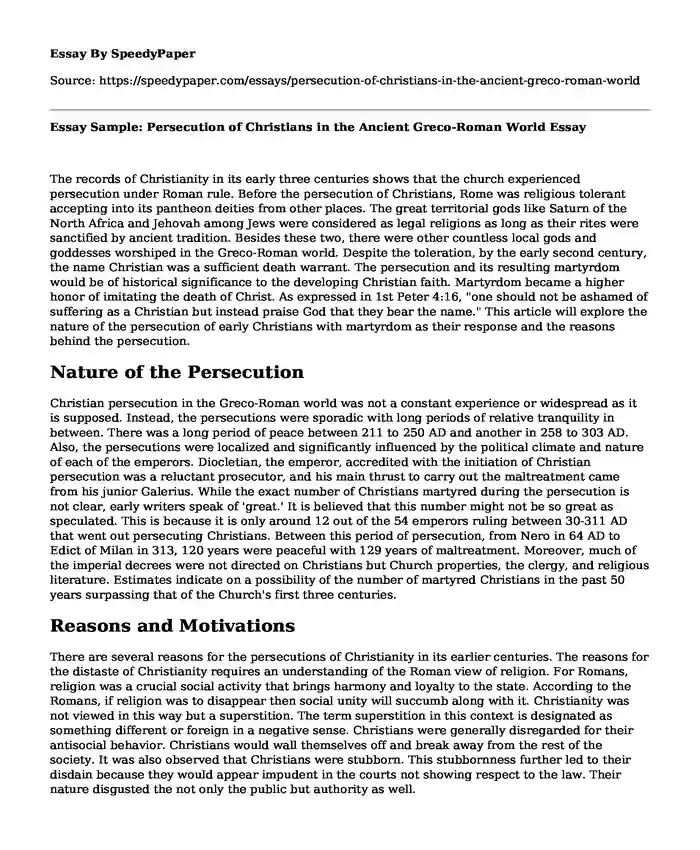
| Type of paper: | Essay |
| Categories: | Christianity Ancient history |
| Pages: | 4 |
| Wordcount: | 834 words |
The records of Christianity in its early three centuries shows that the church experienced persecution under Roman rule. Before the persecution of Christians, Rome was religious tolerant accepting into its pantheon deities from other places. The great territorial gods like Saturn of the North Africa and Jehovah among Jews were considered as legal religions as long as their rites were sanctified by ancient tradition. Besides these two, there were other countless local gods and goddesses worshiped in the Greco-Roman world. Despite the toleration, by the early second century, the name Christian was a sufficient death warrant. The persecution and its resulting martyrdom would be of historical significance to the developing Christian faith. Martyrdom became a higher honor of imitating the death of Christ. As expressed in 1st Peter 4:16, "one should not be ashamed of suffering as a Christian but instead praise God that they bear the name." This article will explore the nature of the persecution of early Christians with martyrdom as their response and the reasons behind the persecution.
Nature of the Persecution
Christian persecution in the Greco-Roman world was not a constant experience or widespread as it is supposed. Instead, the persecutions were sporadic with long periods of relative tranquility in between. There was a long period of peace between 211 to 250 AD and another in 258 to 303 AD. Also, the persecutions were localized and significantly influenced by the political climate and nature of each of the emperors. Diocletian, the emperor, accredited with the initiation of Christian persecution was a reluctant prosecutor, and his main thrust to carry out the maltreatment came from his junior Galerius. While the exact number of Christians martyred during the persecution is not clear, early writers speak of 'great.' It is believed that this number might not be so great as speculated. This is because it is only around 12 out of the 54 emperors ruling between 30-311 AD that went out persecuting Christians. Between this period of persecution, from Nero in 64 AD to Edict of Milan in 313, 120 years were peaceful with 129 years of maltreatment. Moreover, much of the imperial decrees were not directed on Christians but Church properties, the clergy, and religious literature. Estimates indicate on a possibility of the number of martyred Christians in the past 50 years surpassing that of the Church's first three centuries.
Reasons and Motivations
There are several reasons for the persecutions of Christianity in its earlier centuries. The reasons for the distaste of Christianity requires an understanding of the Roman view of religion. For Romans, religion was a crucial social activity that brings harmony and loyalty to the state. According to the Romans, if religion was to disappear then social unity will succumb along with it. Christianity was not viewed in this way but a superstition. The term superstition in this context is designated as something different or foreign in a negative sense. Christians were generally disregarded for their antisocial behavior. Christians would wall themselves off and break away from the rest of the society. It was also observed that Christians were stubborn. This stubbornness further led to their disdain because they would appear impudent in the courts not showing respect to the law. Their nature disgusted the not only the public but authority as well.
Despite religious tolerance in the Roman empire, a faith was valid if its rites, even if they were barbarous were sanctified ancient traditions. Christianity being an upstart or recent contagion in its teachings was distrusted. Consequently, the Roman distaste and the subsequent persecution of Christianity developed on the notion that it was a dangerous movement. Churches were considered secretive, and Christianity termed as 'a cult of Christ' whose members huddled together in corners. Jesus was depicted as a magician with his knowledge of sorcery learned in Egypt. Christians did not have alters, temples or a public image affiliated with them. They never spoke in the open and usually assemble in stealth. This raised eyebrows on their intent and the reason for their persecution.
The other reason would emerge from how the old gods were valued in Rome. The belief among the Romans particularly the political elite was that the old gods gave Rome strength and made it great. The traditional rituals were the core of the right Roman, and the religious practices sustained the whole empire. Christians endangered this aspect of the Roman religion by dishonoring the old gods. Romans feared the growth of Christianity and that it might lead to people abandoning the old gods as Christians had done already. By risking divine wrath as the neglect of the old gods would lead to the abandonment of the empire, so Christians were blamed for all misfortunes. Christians designated as the cause of every public disaster were persecuted consequently.
Conclusion
Despite widespread religious tolerance in Rome, Christianity would be persecuted in it's earlier centuries. Understanding the motives behind the persecution of the church requires an understanding of how Rome viewed religion. Much of the Christian practice was going against the Roman view of religion and hence their oppression.
Cite this page
Essay Sample: Persecution of Christians in the Ancient Greco-Roman World. (2022, Nov 04). Retrieved from https://speedypaper.com/essays/persecution-of-christians-in-the-ancient-greco-roman-world
Request Removal
If you are the original author of this essay and no longer wish to have it published on the SpeedyPaper website, please click below to request its removal:
- Free Essay Sample on Diversity Management
- Free Essay on Crime Scene Investigation Procedures
- Failure Essay Samples
- Stress - Dancing with Wolves
- Essay Example about Chinese and Islamic Empires
- Essay Sample on Adverse Relationship With the Bahamian Paradise
- Essay Sample on A Class Project on the Case Against Amazon
Popular categories




